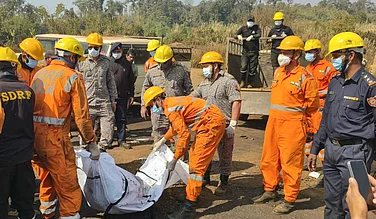Pakistan has witnessed 18 suicide attacks in the first seven months of 2023, which is significantly more than last year when there were 15 attacks in the entire year, according to a think tank report.
The Khyber Pakhtunkhwa province has been the worst-hit of Pakistan's provinces with nine attacks, according to a report by Pakistan Institute for Conflict and Security Studies (PICSS).
In all, the 18 suicide attacks have killed over 200 people and have left over 450 injured. In Khyber Pakhtunkhwa alone, 60 were killed and over 150 were injured.
Findings of the report
Incidentally, the PICSS report comes a day after a suicide bombing claimed by the terrorist group ISIS killed 54 in Khyber Pakhtunkhwa.
In Khyber Pakhtunkhwa, a suicide bombing at a convention of conservative Jamiat Ulema Islam-Fazl (JUI-F) party killed 54. The attack took place in the province's Khar town, which borders Afghanistan. The party is known for its links with hardline political Islam, notes PTI.
The largest attack, however, was the suicide bombing at a mosque in Peshawar in January that killed around 100. The bombing, attributed to the Tehri-e-Taliban Pakistan (TTP), targeted a mosque frequented by police personnel in the elite Police Lines area. At least one deputy superintendent of police (DSP), five sub-inspectors (SIs), and the mosque's prayer leader were killed in the attack.
The restive Balochistan province had at least four suicide attacks within the first seven months of 2023, killing 14 people and injuring 27 others, according to the report. Separately, the report says, one suicide attack was reported in Sindh, claiming five lives and injuring 18 persons.
Threats from ISIS and TTP to Pakistan
The Tehrik-i-Taliban Pakistan (TTP) has emerged as a key security concern for Pakistan. Besides around 100 deaths it caused in the Peshawar bombing, attacks attributed to it have caused over a dozen fatalities as well.
A United Nations (UN) report has termed the TTP as a "persistent" security threat to the country. The TTP is committed to overthrowing the Pakistani state and the establishment of an Islamic state based on Islamic law Sharia. It's rooted in the Afghanistan War.
The TTP is an umbrella group of militants formed in 2007 to oppose the foreign intervention in Afghanistan, according to the US National Counterterrorism Center (NCTC), which further says TTP’s stated objectives are the expulsion of Pakistan from the Federally Administered Tribal Areas (FATA) and neighbouring Khyber Pakhtunkhwa Province and the implementation of a strict interpretation of sharia throughout Pakistan.
"TTP leaders also publicly say that the group seeks to establish an Islamic caliphate in Pakistan that would require the overthrow of the Pakistani Government. TTP historically maintained close ties to senior al-Qa‘ida leaders, including al-Qa‘ida’s former head of operations for Pakistan," says NCTC.
The think tank Counter Extremism Project (CEP) says the TTP was founded by a group of Pakistani militants "who had previously fought in Afghanistan alongside both the Taliban and al-Qaeda, and the group has maintained close ties to both organisations since".
The ISIS affiliate Islamic State Khorasan Province (ISKP) is active in the Afghanistan-Pakistan region. The ISKP is not just fighting the Pakistani government but also the Taliban regime in Afghanistan and the TTP in Pakistan. In Afghanistan, particularly, the ISKP has waged a bloody campaign and several hundreds deaths have been attributed to ISKP attacks. The ISKP particularly targets non-Sunni Muslims.


























